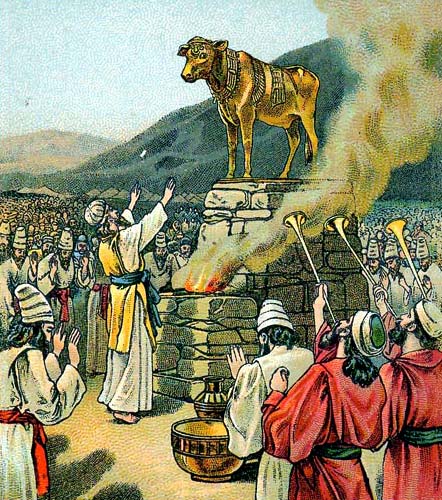Written by Rabbi Jacob Rupp, Jewish Awareness Movement at UCLA
In this week’s Torah portion, Tetzaveh, Moses’ name is not mentioned. The Talmud explains that after the sin of the Golden Calf in next week’s Torah portion, G-d was prepared to get rid of the Jewish people and to start over with Moses’ lineage. Ever the self-sacrificing leader, Moses tells G-d to “erase me from your book” if He would not continue with the Jewish people. The rabbis offer many explanations for why his name, in fact, does not appear in this parshah, considering that the sin of the Golden Calf is recorded in next week’s parshah. One explanation is this week’s portion is the last portion from which Moses’ name can be excluded prior to his explicit request for such conditional removal.
We learn from this episode at least three very important elements; each one so important that I am concerned that including all three in this Taste of Torah will lessen the impact of each one. First of all, it is a great consequence not to be included in the Torah. The rabbis teach us that there are 600,000 letters in the Torah, and 600,000 “root” Jewish souls from which all other souls descend. If one letter in the sefer Torah (Torah scroll) is missing, there is a Jewish law that the entire scroll cannot be read. In addition, kabbalah teaches us that the Torah is really giving us a record not only of what was, but what will be in the future until the end of time. (Parenthetically, Purim is this week, and describes how the Persian Empire sought to destroy all the Jews all at once, and were permitted to attempt to carry out this wicked decree by a morally silent international community. Hmmmm….never heard that before.) The Torah is ongoing. We are a part of that. Without us, its not complete. So each one of us should labor to be a part of the Jewish story, and to realize that our individual accomplishments are crucial for the whole, that one person’s absence from the Jewish community and chain of tradition has repercussions for the entire people.
The second lesson is that we need to appreciate the importance of the negative things we say, especially when they are about ourselves. The Jewish law of “loving your neighbor as yourself” (Leviticus 19:18) puts your self-worth as the standard of how you treat others. Countless books, both Jewish and non-Jewish, have been written about the importance of self-talk and self-esteem. The more you speak down about yourself, the more limited and unable to do things you become. The way in which we see ourselves and talk about ourselves creates the reality in which we live and the lens through which we view others. We must be careful not only to believe in others and to encourage others but to do it for ourselves as well.
Finally, we learn what it means to lead. It doesn’t mean taking home the biggest check, the fame, or the honor. It means to sacrifice. To throw yourself in front of the train to save your group (maybe not in a college group project, but maybe). I read that the single most important trait that the SEAL team 6 looks for in accepting new members to their elite group is how team-oriented they are. Our leaders lead from the front, not from the back. Unlike the classic examples in history of the wealthy and powerful leaders sending the expendables to war, a good leader sees himself as the only expendable who will go down first for his people, group, or team. It is this spirit of service and sacrifice that makes truly great leaders that people are willing to follow.
Happy Purim and a good Shabbos.
____________________
This article is part of Ha’Am’s Friday Taste of Torah column. Each week, a different UCLA community member will contribute some words of Jewish wisdom in preparation for Shabbat.

